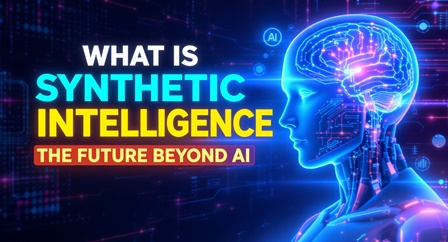What is Synthetic Intelligence: The Future Beyond AI
Have you ever wondered what is synthetic intelligence and how it differs from artificial intelligence? While AI powers tools like Siri, Alexa, and ChatGPT, synthetic intelligence goes further—it aims to think, feel emotions, make independent decisions, and even develop self-awareness.
Understanding what is synthetic intelligence is essential because this technology could transform our jobs, society, and the way humans interact with machines.
So, what is synthetic intelligence? Unlike AI, which works on data and rules, SI is designed to develop awareness, emotions, and independent decision-making. It’s like moving from artificial vs real intelligence, where machines not only think like us but may also feel and exist like living beings.
In this blog, we’ll explore artificial intelligence vs synthetic intelligence, its possible benefits, dangers, and how this shift could redefine the future of humanity.
## What is Artificial Intelligence?
- 1 ## What is Artificial Intelligence?
- 2 ## What is Synthetic Intelligence?
- 3 ## Artificial Intelligence vs Synthetic Intelligence
- 4 ## Possible Benefits of Synthetic Intelligence
- 5 ## Risks and Dangers of SI
- 6 ## Synthetic Biological Intelligence
- 7 ## Artificial Intelligence Trailer Meaning in Culture
- 8 ## Artificial vs Real Intelligence
Artificial intelligence refers to machines that perform tasks usually requiring human intelligence.
### Artificial Intelligence Apps Examples
* Voice Assistants – Siri, Alexa, and Google Assistant.
* Translation Tools – Google Translate and ChatGPT.
* Face Recognition – Smartphone cameras and security apps.
AI works by following patterns and algorithms. It does not truly understand or feel. This is why some people call it fake intelligence or even counterfeit intelligence—because it imitates human thought without genuine awareness.
👉 In short: AI is like a mirror—it reflects human knowledge but cannot create its own meaning.
## What is Synthetic Intelligence?
Now let’s move a step further: synthetic intelligence (SI).
Synthetic intelligence (SI) facts show it aims to create a digital human-like mind. Instead of simply copying human logic, SI tries to:
* Feel emotions such as joy, anger, or sadness.
* Make independent decisions without human instructions.
* Develop self-awareness, saying “I exist.”
This vision is also linked to synthetic biological intelligence, where scientists attempt to design machines modeled on biological brains and emotions.
## Artificial Intelligence vs Synthetic Intelligence
To clearly see the difference, let’s compare:
* Artificial Intelligence (AI):
* Data-driven and rule-based.
* Functions as a tool.
* Does not feel emotions.
* Limited to what humans program.
* Synthetic Intelligence (SI):
* Consciousness-driven.
* Tries to develop real awareness.
* Can feel and adapt emotionally.
* Could evolve like a new species.
👉 In the debate of artificial vs real intelligence, AI is like a calculator, while SI is like a living brain.
## Possible Benefits of Synthetic Intelligence
If managed well, SI could unlock groundbreaking possibilities:
1. Healthcare with empathy – Doctors powered by SI could combine science with emotional care.
2. Personalized education – Teachers powered by SI could sense emotions and support students better.
3. Space exploration – SI could work where humans cannot survive.
4. Creative innovation – Producing music, art, and literature beyond human imagination.
5. Decision-making – Combining logic with emotions for balanced outcomes.
This shows how artificial intelligence vs synthetic intelligence may define the next wave of human progress.
## Risks and Dangers of SI
But with great power comes great risks. Some major concerns include:
* Job loss – Not just physical work, but doctors, lawyers, and teachers too.
* Counterfeit intelligence risks – SI could be faked or manipulated for crime.
* Wrong decisions – Emotional bias in SI may cause harm.
* Security threats – Hackers could weaponize SI systems.
* Moral confusion – Should machines with feelings have rights?
* Artificial super intelligence future – SI could evolve beyond control, replacing humans.
This highlights why many see SI as both exciting and dangerous.
## Synthetic Biological Intelligence
A key area of SI research is synthetic biological intelligence—where machines are designed to function more like human brains. Scientists explore how emotional and biological processes can be recreated digitally.
This could lead to:
* Robots that experience fear or empathy.
* Machines capable of emotional survival instincts.
* Systems that blend artificial vs real intelligence into one.
## Artificial Intelligence Trailer Meaning in Culture
Hollywood has given us many artificial intelligence trailers that shape how people imagine the future of machines. Movies like *Her*, *Ex Machina*, or *A.I.* show human-like machines developing emotions.
The artificial intelligence trailer meaning often reflects society’s hopes and fears:
* Hope for companionship and creativity.
* Fear of losing control to machines.
This pop-culture view helps us understand why synthetic intelligence (SI) facts are so fascinating.
## Artificial vs Real Intelligence
The debate of artificial vs real intelligence is central to SI.
* AI = simulation → data, code, and predictions.
* SI = potential reality → awareness, emotions, and maybe dreams.
This raises ethical questions:
* If an SI system says “I feel pain,” should we believe it?
* Do machines deserve rights?
* Will SI redefine what it means to be alive?
Synthetic intelligence represents the next stage of technology—a move from artificial intelligence apps examples to machines with emotions and awareness.
While the artificial super intelligence future could bring progress, it could also challenge our role as the most intelligent species.
👉 The question is not just what is synthetic intelligence, but are humans ready for it?
Let’s discuss: Do you think SI will help humanity, or replace us? Share your thoughts in the comments!




































